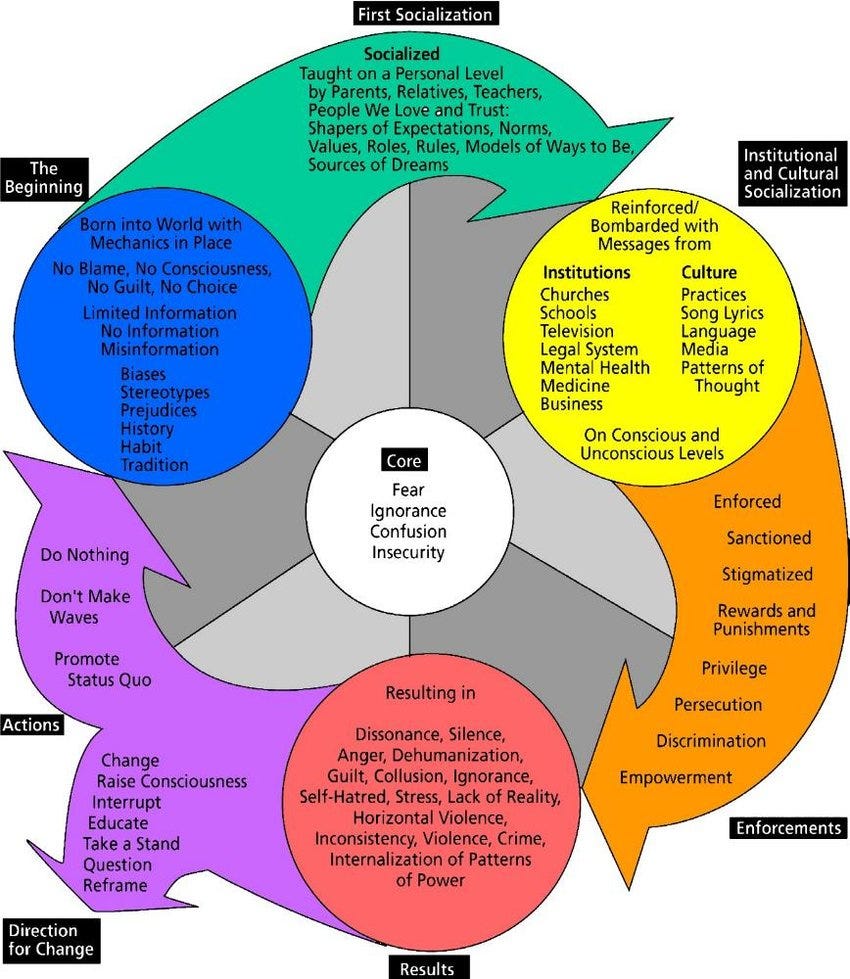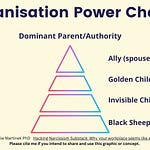Your email provider likely truncated this piece as it’s long. Please click on the article link in your email to read the complete article in Substack. Thank you.
Free subscribers can see a preview of this premium article. Upgrade now to access the full article.
NOTE: I have used gender neutral pronouns (they, them, theirs) throughout to refer to individual family members/roles.
I invite you to notice the gender you automatically assign to the family member you are reading about. This will assist you to become aware of the family member being described that relates to your own family system.
Family Trauma
Every family exists as a family system where each member plays a specific role to raise adults who are socialised and capable of meeting their needs independently1. In a functional family system, children’s developmental needs are centred and each member contributes to a supportive, loving, reciprocal, secure and respectful environment.
Families with parents who have a history of generational or intergenerational family trauma and who do not participate and experience healing in therapeutic recovery processes, can develop into a dysfunctional family system 2. These parents develop narcissistic features because their childhood environment was deficient in demonstrative caring and attention (neglect/abuse) or excessive caring attention (pampering and praising) by their parents3. Both these parenting styles perpetuate a cycle of socialisation (figure 1) that impedes the development of the child’s agency, security and socioemotional capabilities needed for independence as well as reciprocal and interdependent relationships in adulthood4 5. These parenting styles exploit a child’s powerlessness and dependency and contribute to the development of insecure attachment to the parent in the form of a trauma bond6. The child will continue to show allegiance toward the parent despite the parent’s continual neglectful, oppressive or destructive behaviours toward the child.
Children who experience various types of relational and repeated oppressive behaviour throughout their early developmental years can develop complex trauma7 8. The betrayal of trust by authorities who are meant to provide safety, nurturing and stability impacts on the child’s sense of safety and trust in the world around them. This is similar to occurrences of trauma from natural disasters, car accidents and relationship betrayals as these impact on the trust in the self, authority figures, their environment, nature and a higher power’s ability to keep the person safe from harm9.
In addition to the emotional dysregulation, a symptom of traumatic stress response, the child experiences relational disconnection within all their relationships resulting in a gradual reduction of empathy - the ability to be other oriented by attuning to the needs of others - and develop behavioural adaptations that ensure their basic survival needs can be met by others10. When empathy is compromised, the child grows into an adult dependent on others to meet their survival needs without awareness or consideration of the impact on those who provide their supply of resources11. When a child and their family do not engage in or do not benefit from restorative therapeutic processes to improve the family dynamic, the child will develop into a self-oriented, co-dependent adult in perpetual post-traumatic stress response that drive narcissism spectrum behaviours12 13. These habitual behaviours are required to recruit and maintain relationships that serve the adult’s needs, without regard for the wellbeing of the supplier14.
They will continue to re-enact co-dependent relationship dynamics with everyone in their life who have the social power required to supply them with necessary resources that assure their survival and successful ascension up the social stratosphere15. As the adult continues to seek social power by exploiting their relationships and the access to the resources these relationships provide, these traumatising behaviours that began and continue in the family system are transmitted to the next generation16, infiltrate relationships in personal and professional spheres and are re-enacted in relationships with broader societal systems17.
Figure 1: Cycle of Socialization
The Cycle of Socialization by B. Harro (1982). A framework of the diverse societal influences on human socialization that begins in the family system.
The Dysfunctional Family System
Unlike a functional family system, the dysfunctional family system centres the needs of a narcissistic parent(s), such that the children and other adults are exploited to accommodate the parent and family’s needs 18 19.
A common dysfunctional family system is governed by a dominant parent whose values and beliefs are transmitted to each member in the way they are socialised. The children are raised to fulfil the implicit and explicit obligations of the family to perpetuate the dominant parent’s desired legacy. Each member of the cultural kinship that comprises the family system functions to protect, preserve and submit to the status, needs and demands of the dominant parent or authority figure, regardless of the oppression occurring in the system20 21.
The members of the Dysfunctional Family System are stratified within a fluid hierarchy, where each member is born into a pre-existing blueprint of the specific role they will play to maintain the family system and the dominant parent’s supremacy. The position in the hierarchy becomes the template for each child’s socialisation and the relationship dynamics each member will have with others beyond the family system22.
The assimilation into the dysfunctional family system establishes a relational pattern between the child and authority figure that will be re-enacted in the broader socio-political, economic and cultural landscape.
Each of these roles already exists in the family system before the child is born. These roles are performed without any conscious awareness that each member is participating in maintaining a cycle of socialisation because this family dynamic is a replica of the generation before, and is normative and familiar behaviour23.
Free subscribers can see a preview of this premium article. Upgrade now to access the full article.
Listen to this episode with a 7-day free trial
Subscribe to Hacking Narcissism to listen to this post and get 7 days of free access to the full post archives.









